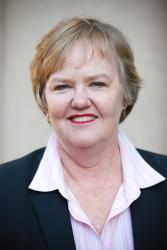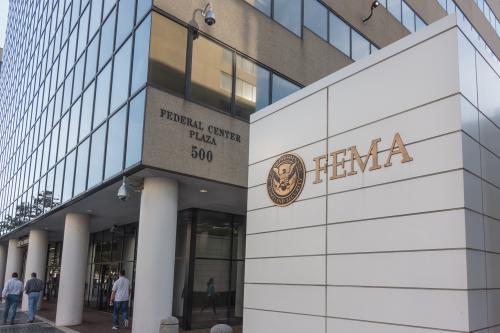‘Not your typical Brookings meeting,’ I thought as I greeted participants at our meeting on human rights and natural disasters in El Salvador last week. For starters, most wore brightly colored uniforms — red, yellow, orange, and the less bright camouflage. These were the disaster responders of the region — firefighters, special military units, and the ‘FEMAs’ of Central America together with the Red Cross and human rights organizations. This was the first meeting of its kind in Central America — and certainly the first time that Brookings had convened a gathering of disaster responders in the region — or anywhere.
Over the past few years, our work with internal displacement led us to develop Operational Guidelines on Human Rights and Natural Disasters — which the United Nations subsequently adopted and which now serve as the basic guidance for policy-makers and relief agencies in responding to earthquakes, hurricanes, mudslides, and floods. For too long response to natural disasters had been seen exclusively in terms of logistics and delivery of relief items. But after the 2004 tsunami, our project took the lead in pointing out that disaster response is as much about rights as about deliveries of water and high-protein biscuits. Temporary shelters become places of violence, as evidenced in Haiti today. Discrimination in delivery of assistance is all too common and politics is a factor in determining who receives timely assistance and who doesn’t. These are human rights issues and we were encouraged that this rights-based approach has now become a standard operating procedure in UN, NGO, and governmental policies in disaster response.
But developing good guidelines isn’t enough. The offices of humanitarian agencies are filled with reference books and CDs which remain on the shelves. If a human rights approach to disaster assistance is to be meaningful, you’ve got to engage the people who can change things. So last year in Guatemala, we held a workshop for policy-makers and human rights organizations in Central America. It was an eye-opener for everyone. The governmental national disaster agencies weren’t used to taking a human rights approach, the human rights organizations hadn’t thought much about monitoring responses and in several of the countries, the two groups had never talked to one another prior to the Brookings seminar. Participants felt the workshop had opened doors but urged us to do more: to work with the fire fighters, the military and the Red Cross who are the first on the scene. So we took up the challenge and together with the Center for Coordination of Disaster Risk Reduction in Central America and Protección Civil , El Salvador’s national response agency, we organized a workshop in San Salvador for the first responders.
This workshop too was an eye-opener — for the participants and for me. Discussing with national governmental officials in Central America was easy. But when you want to influence the way communities receive assistance, engaging the people on the ground is paramount. Thus, participants in our workshop visited communities affected by hurricanes, mudslides and flooding. We spoke with women who had lost children because the early warning system didn’t work (‘the batteries were dead’ an official sadly explained.) We talked with a mayor who sighed and said aid to his small village was delayed because he belonged to a different political party than the government. I talked with the commander of a specialized military unit who responded with impatience when we talked of international human rights standards: ‘of course we want to do what is right, but when it’s 3 am and the electricity is gone and the waters are rising and people don’t want to leave their homes, what is the right thing to do? Do we force them to leave against their will? Is it a violation of their human rights to force them to leave? Or do we leave them there to die?’ I didn’t have a good answer – there is no clear answer in international law. But this is a question which our Project will undertake over the course of the next year: when is it OK to force people to abandon their homes? Given the realities of climate change, it is a question that will only become more important.
Not a typical Brookings seminar. In addition to the important learning that took place in the region for first responders, the seminar also provided an unusual research opportunity – to hear firsthand from Honduran fire fighters, Costa Rica’s Red Cross and Salvadoran mayors about their daily experiences. My next book will be about human rights, politics and natural disasters. If I’d followed a typical research methodology and scheduled individual interviews, it would have taken me weeks to collect as much information as I did in a few days at this workshop. I came away from this workshop with 30 pages of notes about human rights, natural disasters and politics which I’ll incorporate into my next book. I also came away from this workshop with tremendous admiration for the search and rescue teams, the fire fighters and the local Protección Civil workers who coordinate assistance in all kinds of disasters. I feel a sense of pride that because of our work, they are now more conscious of the human rights dimension of what they do.
Brookings is about quality, independence, and impact. I’m proud of the quality and independence of our Project’s research – but I’m most proud when I see the direct impact of our work on some of the world’s most vulnerable people. Not your typical Brookings seminar. But something of which Brookings can be very, very proud.



